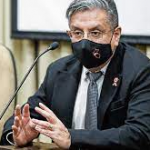 Peru’s mining minister Ivan Merino reported Thursday that the unrest at the huge Las Bambas copper mine was partly caused by MMG Ltd’s decision to rely on a dirt road to transport the metal, and called for a rail line to be built instead.
Peru’s mining minister Ivan Merino reported Thursday that the unrest at the huge Las Bambas copper mine was partly caused by MMG Ltd’s decision to rely on a dirt road to transport the metal, and called for a rail line to be built instead.
The dirt road has become a lightning rod, fiercely opposed by the leaders of the communities it crosses in Peru’s impoverished but copper-rich Andes. Leaders in one province, Chumbivilcas, blocked the road for three weeks until Wednesday, causing Las Bambas to almost halt copper production.
The tension is a key test for Peru’s leftist President Pedro Castillo, who wants to increase mineral wealth in the world’s second-largest copper producer to fund social programmes, but must balance those ambitions with the social unrest some mining projects create.
Merino has indicated that a train would help defuse these tensions. While Merino has already talked about building a mining railway in the Peruvian Andes, this is the first time he has called for the train to specifically reach the Las Bambas mine.
There are also tensions over future mining projects, such as Southern Copper’s Tia Maria copper mine.
The Castillo administration is also trying to renegotiate the country’s biggest energy contract, which allows the Camisea Consortium, led by Argentina’s Pluspetrol, to exploit natural gas. The administration wants to get higher payments.
Fitch could downgrade the credit rating of Hunt Oil Peru, a member of the Camisea Consortium, based on the renegotiation of the contract. The negative outlook would reflect increased political and regulatory risk resulting from the Peruvian government’s recent request to renegotiate the Camisea Consortium’s licence agreement.
.gif) Loading
Loading

